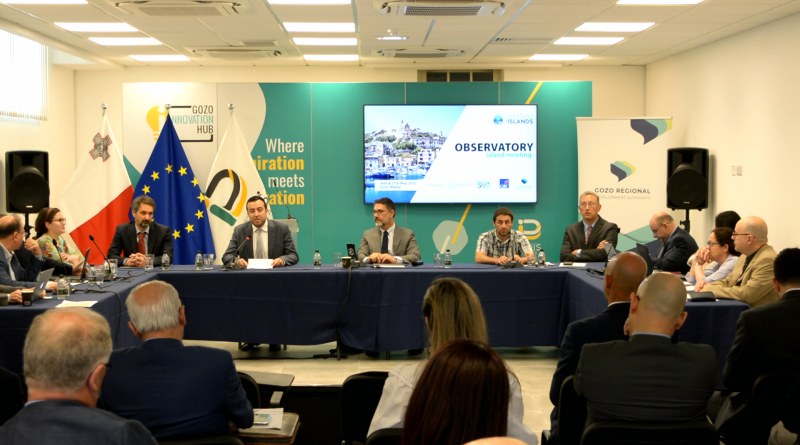At Greening the Islands Observatory meeting priority solutions are identified for Gozo as it aims towards reaching carbon neutrality by 2030

Global experts, local stakeholders and community establish a task force for Gozo to implement the island’s sustainable transition, coordinated by GRDA with GTI support
The GTI Observatory organized a high-level meeting in Gozo (Malta) on 26-27 May, to bring together key Maltese stakeholders and authorities, as well as leading international institutions and innovators, and explore solutions in support of Gozo’s strategy for sustainable transition as a model for the decarbonization of the entire island state.
Hon. Clint Camilleri, the Minister for Gozo, introduced the event stating: “I’m glad that Gozo is hosting this meeting, because the areas that will be discussed are central to our island. Gozo wants to become carbon neutral by 2030 and the GTI Observatory meeting is another step towards a more sustainable island, for this generation and those to come.”
The operative and interactive meeting was hosted by the Gozo Regional Development Authority (GRDA) at the Gozo Innovation Hub and saw the participation of the Ministry for Gozo through the Eco-Gozo Directorate and other competent ministries, the Gozo Business Chamber, various national authorities and corporations, educational institutions and the representatives of the community, among others.
The meeting tackled the areas of energy, water, waste, mobility (land and sea), agriculture, air quality, exploring best practices and innovative solutions with the help of international experts and GTI Observatory corporate members like Enel X, Enphos, Naked Energy, REair and more. A special focus was dedicated to governance and inclusion as a transversal driver of the sustainable transition. The stakeholders that participated in the meeting will be integrated into the consultative structures/ committees coordinated by the GRDA and where applicable the GTI will provide support.
Mr. Mario Borg, CEO of the Gozo Regional Development Authority, said that in the coming weeks, the Authority will launch the strategy for Gozo following a consultation process, with particular focus on the long-term vision of the island and measures that can be implemented.
“This meeting aimed at defining a plan to accelerate the island’s decarbonization. Once again, we were able to gather all the key decision makers and the community of the island to discuss and share the strategy for a sustainable transition, identifying gaps and solutions for each sector. We will be pleased to support GRDA in helping Gozo become a fully sustainable destination and a global leader for sustainability”, said Gianni Chianetta, GTI Director.
Among the main takeaways, the necessity to ensure that regulations enable mid to long term plans emerged strongly, with particular reference to the energy, technological, and behavioral transitions. The promotion of renewable energy self-consumption policies and technologies, as well as of energy communities including storage – starting from industrial districts – and smart grid technologies, can allow a greater renewables penetration in the island’s grid while ensuring its stability. As confirmed by several international experts in various fields, investing in renewables and innovative technologies can also impulse the creation of many green jobs and help incentivize the youth to remain on islands.
The younger population has also a key role to play in the transformation of the agricultural sector on smaller islands, as food security issues increase and soil erosion worsens while agriculture’s share in their GDPs keeps diminishing. Concerning the promotion of integrated pesticide management (using insect traps, soil solarization, etc.) and nature-based solutions in order to minimize their use, Gozo could disseminate to the entire state the experience of its existing experimental farm relative to crop productivity, pesticides and water management, and much more.
Clearly, the value of local products should be protected by establishing fair prices and promoting gastronomy initiatives, in order to compete with imported produce. It is also important to exploit the benefits of agrivoltaics, involving farmers as co-leaders of the projects. Engaging in joint innovative projects (e.g. with Instituto Tecnologico de Canarias, INSULEUR) boosting the share of knowledge can help engage the youth and accelerate progress in the sector.
Yet, as climate change worsens, one of the most heavily felt effects is water scarcity – a truly global challenge. Small islands like Gozo, therefore, need to promote tap water consumption by acting on the improvement of water grids minimizing losses The optimization of rainwater harvesting and wastewater treatment are crucial. Making sure every water source on the island is used more than once before it reaches the sea can help reduce supply costs and lower plastic waste.
Waste management is in fact a big challenge for islands with high tourist inflows like Gozo, due to the lack of economies of scale and the waste concentration around weekends and public holidays. Thus the pivotal role of composting and re-use programs. Acting for waste prevention by creating local repair and reuse centres and engaging hotspot areas in joint initiatives can help maximize second-hand purchases and create new local jobs. Significant opportunities can be unlocked by raising population awareness with communication campaigns and educational programs.
Fostering behavior shifts is also a priority in the mobility field, by training stakeholders and mobility managers while improving safety in land transportation with better policies and infrastructure, as well as exploiting the nexus with sustainable tourism promoting the use of bicycles as the main transport means on islands. Gozo is reached several times on a daily basis by fossil fuels powered vessels, contributing to higher costs and pollution levels, while - as best practices shown during the meeting confirmed - solutions already exists with full electric vessels which are cleaner.
Adopting an integrated approach for vehicles and infrastructure shift, considering the interconnection of sea and land transportation, and addressing simultaneously the energy and transport sectors are key steps towards the creation of longer-term plans for the island’s decarbonization. From unlocking savings by applying in joint tenders with other islands and partners, to exploiting what worked elsewhere by transferring best practices, and to monitoring air quality with innovative systems and methodology (such as a dedicated index to be featured by the GTI Observatory Index), small islands can join forces and obtain larger and quicker results in sustainable mobility and other sectors.
Joseph Borg, President of Gozo Business Chamber and INSULEUR, commented: “we need to act now. The opportunities out there are immense. However, we need to start building on a long-term plan integrating all the aspects.”
A report of the meeting will be produced, with the support of the GTI Specialists, to disseminate the results and offer guidance to Gozo’s decarbonization strategy. The recommendations will be used as inputs into the Gozo Regional Strategy and their implementation facilitated through the consultative structures/committees set up by the GRDA.




